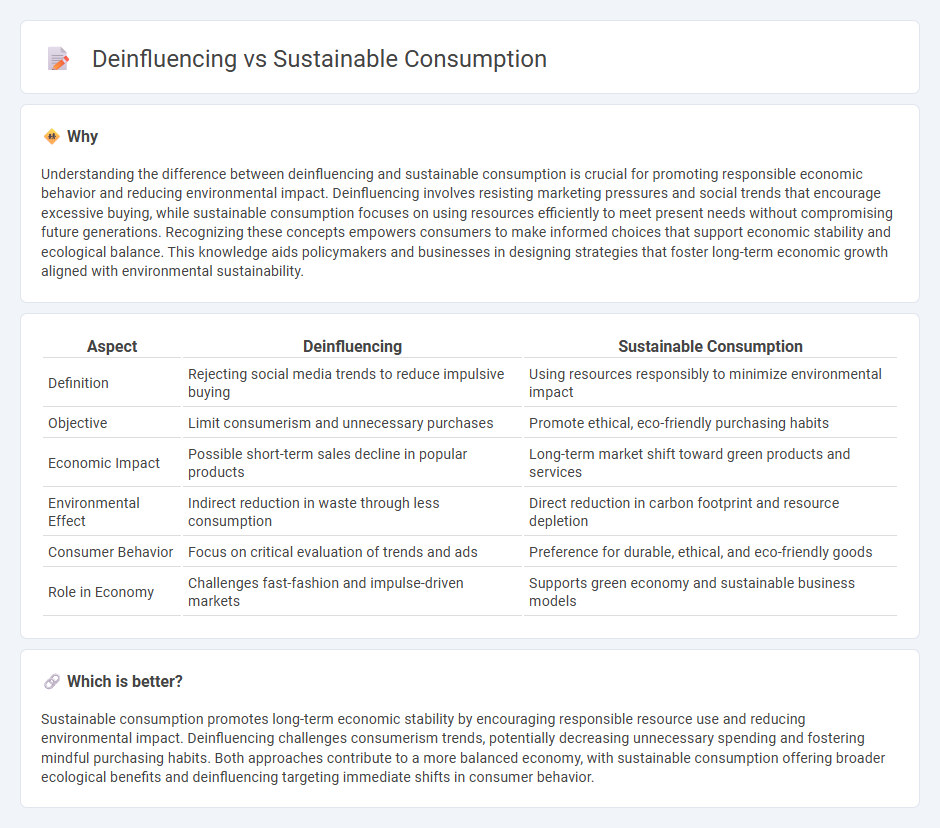
Deinfluencing promotes conscious consumer choices by reducing impulsive purchases driven by social media trends, aligning closely with the principles of sustainable consumption. This shift encourages spending on quality, durability, and ethical production, which supports long-term economic resilience and environmental preservation. Explore how intertwining deinfluencing with sustainable consumption can reshape economic behaviors for a greener future.
Why it is important
Understanding the difference between deinfluencing and sustainable consumption is crucial for promoting responsible economic behavior and reducing environmental impact. Deinfluencing involves resisting marketing pressures and social trends that encourage excessive buying, while sustainable consumption focuses on using resources efficiently to meet present needs without compromising future generations. Recognizing these concepts empowers consumers to make informed choices that support economic stability and ecological balance. This knowledge aids policymakers and businesses in designing strategies that foster long-term economic growth aligned with environmental sustainability.
Comparison Table
| Aspect | Deinfluencing | Sustainable Consumption |
|---|---|---|
| Definition | Rejecting social media trends to reduce impulsive buying | Using resources responsibly to minimize environmental impact |
| Objective | Limit consumerism and unnecessary purchases | Promote ethical, eco-friendly purchasing habits |
| Economic Impact | Possible short-term sales decline in popular products | Long-term market shift toward green products and services |
| Environmental Effect | Indirect reduction in waste through less consumption | Direct reduction in carbon footprint and resource depletion |
| Consumer Behavior | Focus on critical evaluation of trends and ads | Preference for durable, ethical, and eco-friendly goods |
| Role in Economy | Challenges fast-fashion and impulse-driven markets | Supports green economy and sustainable business models |
Which is better?
Sustainable consumption promotes long-term economic stability by encouraging responsible resource use and reducing environmental impact. Deinfluencing challenges consumerism trends, potentially decreasing unnecessary spending and fostering mindful purchasing habits. Both approaches contribute to a more balanced economy, with sustainable consumption offering broader ecological benefits and deinfluencing targeting immediate shifts in consumer behavior.
Connection
Deinfluencing promotes conscious consumer behavior by encouraging individuals to reject impulsive purchases driven by social media trends, directly supporting sustainable consumption goals. Sustainable consumption focuses on reducing environmental impact through mindful product choices, aligning with deinfluencing's emphasis on authenticity and intentionality. Both concepts work synergistically to shift market demand towards eco-friendly, durable goods, fostering a circular economy.
Key Terms
Circular Economy
Sustainable consumption emphasizes reducing waste and resource use by adopting products designed for longevity and reuse, aligning closely with the principles of the Circular Economy that promotes closed-loop systems and minimal environmental impact. Deinfluencing advocates for a critical removal of excessive consumerism encouraged by social media trends, encouraging mindful purchasing decisions that support sustainability. Explore how combining sustainable consumption with deinfluencing strategies can drive a more effective Circular Economy.
Greenwashing
Sustainable consumption emphasizes reducing environmental impact through mindful purchasing and resource use, countering the deceptive practices of greenwashing that falsely present products as eco-friendly. Deinfluencing challenges social media-driven consumerism by encouraging critical evaluation of product claims, exposing greenwashing tactics that exploit sustainability trends. Explore deeper insights into how deinfluencing combats greenwashing for genuinely sustainable consumption.
Ethical Consumerism
Sustainable consumption emphasizes reducing environmental impact by choosing products made through responsible sourcing, minimal waste, and fair labor practices to promote ethical consumerism. Deinfluencing challenges aggressive marketing tactics by encouraging consumers to critically evaluate their purchases and prioritize meaningful, value-driven consumption habits. Explore how these approaches reshape consumer behavior and lead to more conscious buying decisions.
Source and External Links
Sustainable Consumption | Definition, Background & Goals - Lesson - Sustainable consumption involves using products and services to meet human needs while minimizing environmental impact, ensuring resources are used wisely and waste is minimized for current and future generations.
Sustainable consumption - Wikipedia - Sustainable consumption refers to using products and services in ways that reduce environmental impacts throughout their lifecycle, balancing present-day needs with those of future generations and often linked with sustainable production and lifestyles.
Sustainable consumption - OECD - Consumers' choices play a critical role in sustainability, with lifestyle changes potentially reducing global greenhouse gas emissions by up to 70% by 2050, supported by policies like the right to repair and combating greenwashing.
 dowidth.com
dowidth.com